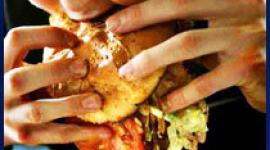Beat Bulimia - Bulimia Treatment with Judith Asner, MSW
Online Conference Transcript

Judith Asner, MSW is a bulimia treatment specialist and founded one of the first outpatient eating disorders treatment programs on the east coast.
David is the HealthyPlace.com moderator.
The people in blue are audience members.
David: Good evening everyone. I'm David Roberts. I'm the moderator for tonight's conference. I want to welcome everyone to HealthyPlace.com. I hope your day has gone well. Our conference tonight is entitled "Beat Bulimia, Bulimia Treatment". Our guest is eating disorders treatment specialist, Judith Asner, MSW.
In 1979, Judith Asner opened one of the first outpatient eating disorders treatment programs on the east coast. Ms. Asner has been trained in psychodynamic psychotherapy, cognitive-behavioral therapy, and group psychotherapy.
She has presented papers on eating disorders at the American Group Psychotherapy Association and the International Association of Eating Disorders Professionals. In addition to primarily treating bulimics, Ms. Asner also publishes an eating disorders newsletter.
Good Evening, Ms. Asner and welcome to HealthyPlace.com. We appreciate you being here tonight. Because each person in the audience may have a different level of understanding, can you please define bulimia, bulimia nervosa for us (bulimia definition). Then we'll quickly get into the details.
Judith: Bulimia (bulimia nervosa) is defined as periods of uncontrolled eating. The person eats anywhere up to 10,000 calories in a sitting. Binge eating is followed by purging behaviors, i.e. vomiting, laxatives, exercise or sleep.
David: I think it's also important for everyone here tonight to know that you suffered from bulimia and it started over 30 years ago when you were 21. How did you develop it?
Judith: I developed "sudden onset bulimia", after the sudden death of a parent--a real trauma. But I certainly had some eating and body image issues all along.
David: This is back in the 1970s when no one was really talking about eating disorders. Did you know what you had, and what was it like for you?
Judith: I thought I was awful, that I discovered the best and the worst behavior in the world. I had no idea what disease it would become. Thank heavens for Jane Fonda because she spoke up about her experience with bulimia nervosa in 1980.
I lived in great anguish that someone would find out about me. Yet, I got so much positive reinforcement for being thin that it was all so confusing. There was so much praise for being thin from society, and men especially, that I wished I had discovered it sooner. I thought it would end all of my problems. Right!
David: You mentioned that you lived in great anguish that someone would find out about your having bulimia. Tell us how the disease progressed in you.
Judith: I began to get so into being thin, that I threw up several times a day. And I would binge on anything my heart desired, even on things I had deprived myself of before. It seemed like an answer to being just slightly overweight. And attention and beauty were a high! It is so sad to see the values that some people have about beauty.
David: Today though, it's still very difficult for someone with an eating disorder to talk about it. In fact, from what I've read, and from talking with bulimia sufferers, having bulimia nervosa is a real stigma; even worse than having anorexia.
Judith: I am sure it was a way to blunt emotion. Don't forget, I was dealing with parental loss. Bulimia is not a pretty disease. It does not bring admiration, as starving does. Starving is called "the moral superiority of anorexia nervosa." Being able to starve is an art. One feels so morally superior! Society admires starving women.
Not so with purging out of control women! There is no moral superiority in throwing up your food after stuffing yourself. But all in all, it is a way of avoiding feelings by focusing on food and thinness.
David: Here are a few audience questions, Judith:
dano: What is different between bulimia, and say, for instance, a person that eats and then 20 minutes later is really hungry and feels the need to eat again?
Judith: That person is responding to true hunger cues, I hope. With bulimia, one is unaware of one's true bodily needs and hungers. The satiety, or satisfaction signal, becomes disturbed during the course of the disease. The person who eats when hungry is responding to a real bodily cue, and the person who eats again is responding to hunger, not emotions. People with bulimia are not in tune with real hunger cues. The signals are disturbed by, or even before the disease.
|
|
girlguide: Judith, did you have to deal with your bulimia while going through school?
Judith: Yes, I was a grad student in social work, if you can possibly believe that. Can you imagine the amount of shame I felt, saying I was someone who could help others when I could not even tell anyone about my secret? But of course, today, as a grown up and experienced therapist, I understand that the wounded healer is the most capable of feeling empathy.
It is so important for one to understand that no one is perfect. We all eventually get a disease. How can we be who we really are, or be authentic, if we do not allow ourselves to be human? So much of the illness is about a "false presentational self" of being perfect.
No one is perfect. Every personality has its glitches. Every single person has some problem.
David: What did you do to cope with the shame? And then, what made you get past the shame and decide to get help?
Judith: Many years of anguish and reading about the subject led me to finally realize that I might not be alive if I kept up such destructive behavior. I had to face that part of myself. It was very, very hard work and many years of therapy trying to understand why I did not love and accept myself as I was; why I thought my value was in being thin, not in my work or my being.
Don't forget, this was the 70's and 80's. Thinness was everywhere. The media made it into life's most important accomplishment. You could not get away from the message that nothing else mattered. The TV, magazines, and movies showed one thin woman after another. If one was susceptible to the media, the message was clear.
Do you know a woman's self-esteem goes down after watching 30 minutes of thin women on TV? Madison Avenue depends on this. It sells!
David: Just so everyone in the audience knows where you are coming from, have you completely recovered from your bulimia? (bulimia recovery)
Judith: I said I was not perfect! But always improving. One is always susceptible to a comforting but maladaptive behavior and has to be ever on guard.
There are many trigger foods that I do not have in my home today. Why? Because they are trouble for me. I still do not keep sweets in my home because I know enough to avoid these troubling foods.
When coupled with stress, any trigger can set off a binge. Is this recovery? There are many theories about that. Some say that one should debunk all food myths and eat any food in a proper proportion. That is good, theoretically, but it just doesn't seem to work for many women with bulimia.
I think, at least initially, it is best to deal with what one can manage. Perhaps in time, in a calm, safe environment, trigger foods can be managed in small amounts. Every person if different, but most have problems with foods that combine fat and sugar.
David: The audience has a lot of questions, Judith. Here we go:
wauf5: I understand that there is no "quick fix" for bulimia. I've suffered for over half my life. So what, if you had to put it in one short paragraph, is your answer?
Judith: First, I can really empathize with you. It is so tough.
If I were to say 2 things they would be: You really have to monitor yourself one MINUTE at a time, not just one day at a time. You need constant positive self-talk. "I can, I can."
Then, it is the capacity to continually say NO to one's desire to give in, and to get busy with something other than food. It really is a constant effort.
I wish I could give you a simple easy answer to cure it, presto. But you know, the more accepting you are of yourself, the more you can be honest about who you are with others, and you can ask them to help you in any way you need to be helped. The support of people who are there for you is essential.
Lex:My eating disorder resurfaced about 8 months ago and it has gotten so bad even though I see someone, it keeps getting more out of control. I feel so anxious when I think of eating, and if I eat (rarely), I can't keep it down. Any suggestions?
Also, I am worried it is going to get so bad. Is it that I need hospitalization? Any suggestions on what I can do to try and avoid that and help myself?
Judith: Have you spoken to a psychopharmacologist psychiatrist who can suggest a medication to help you with the compulsive behavior? Have you seen a nutritionist so you know exactly what you can eat without gaining a lot of weight? Are you going to daily 12-step Overeaters Anonymous groups?
David: Here are a few audience comments on what's being said so far. Then we'll continue with the questions.
mazey: I wasn't thin, about 190 lb., going into eating disorder treatment at 21. I got into a life-threatening emergency situation. Was in a medical hospital because I could no longer keep anything down, including water. Even if I wanted to eat or drink, my body rejected everything. I was closet binge/purger.
I haven't purged in at least 5 years. I have irreversible damage in my stomach and esophagus and don't have many teeth left. I have learned that for me, the purging was a control issue. When things were most out of control, I had this secret and was in full control. Losing weight, eating big time, and living with my face in the toilet. That was control, so I thought.
|
|
Haven: I've been in a terrible bulimic "phase," bingeing and throwing up for a few years now, although I've had this for 12 years. I have 3 kids and want to change but am SO stuck now. It is an addiction now? I really feel powerless, it controls me. And I hate saying that, but it is true. Everything I eat makes me feel guilty and it leads to bingeing--I'm a true blue mess, Judith.
Judith: You must love your kids so much. Go to Overeaters Anonymous for you and for them.
Lori Varecka: That is what they tell us in the hospital "all foods are good". "Get busy" with the computer and isolation from my family. My husband isn't so keen on that. I have to do something after dinner though.
Same here, Lex, about the anxiety and things getting more out of control now.
Judith: Lori, can you talk to your husband and can he help you?
wauf5: I hear ya, Haven!!!!
David: Here's an audience question:
diane74: I've been struggling with bulimia for 4 years. I'm trying so hard to beat it for the sake of my husband, my two little girls, and me. How do I overcome the overwhelming fear that if I quit this behavior, I'll become fat?
Judith: A fear is not a reality. Work with a nutritionist or a therapist who can give you support and reassurance and who can help you modify your meal plan if you gain weight.
Is being here for your family more important than a few pounds? Think about how important you are to your loved ones and yourself. Your life is no small life--it is a big and important one. You deserve health. It is your birthright. Remember, balance.
David: For those who have asked, here's the link to the HealthyPlace.com Eating Disorders Community.
Here are some more audience questions:
Amy4: What advice do you have for someone who has been bulimic for 15 years?
Judith: Happiness is our natural state. We are meant to live that way. Often, women with bulimia feel they don't deserve happiness and they hurt themselves and deprive themselves of it by the bulimic behavior. Seek help. It is never too late to get well. Most people seek treatment well into the illness but not right away. I see many women who do recover after 15 or even 25 years. Five to six years is the mean years for most to seek treatment.
David: I want to post some audience comments here because I think it's important to realize that if you suffer from an eating disorder you are not alone, your feelings about what you are going through aren't abnormal or weird. There are others in the same position.
larissa: I also have anorexia along with being bulimic.
Marion: Not a question, but a 'thank you" to Judith for the last few comments. I work (with enormous success), on a private basis with eating disorder sufferers, yet I continue to struggle with alcohol issues myself...of course, in my "private world".
Judith: Thank you, Marion, for bringing that up. They seem to go together.
leslie2: I'm just really scared.
Kiki: I was anorexic then bulimic. Started out at 120 lb. and went down to 75 lb. I went into the mental health profession because I knew this was wrong and I thought I could "cure" myself. I have been going to a therapist for a year and while things are better (no more binge/purge) I still have the same ideas about food and control. I have used laxatives in the past few months, which I am really ashamed of.
Lex: I am 800 miles from my family. My best friend is here, but even though she knows, she doesn't understand when I ask for help like not going somewhere to eat where I feel uncomfortable, where we end up eating hoagies. I feel so alone and discouraged at times.
Lori Varecka: I do see a therapist and a nutritionist (who used to work at the eating disorders' section of the hospital). Even with the meal plan, which I can't seem to stay on, it isn't helping. I find outpatient not as helpful as partial or inpatient - but I don't want that again (after 3 hospitalizations in 3 1/2 years).
Judith: Do not be ashamed. In the grand scheme of things, bulimia is not a CRIME. It is just an illness and needs to be treated, like any other illness. Please give yourselves a break.
leslie2: I am almost 26 and was diagnosed last year and I'm just starting treatment now. Everyone seems concerned, but me. Why is that?
Judith: That can be Denial.
sillyme: My biggest problem is that I binge but don't purge, and I am up to 250 pounds and still going up. I am concerned about my health, but I just don't know how to stop.
Judith: Ladies, you are not alone. We can be a virtual community and can support each other. Try Overeaters Anonymous, It can help you find a saner way of life. Sane, as insane eating that is, sillyme. We are silly to hide ourselves. We are all beautiful human beings.
|
|
David: You are right Judith--about being a virtual community. And I don't mean to be self-serving here, but that's what HealthyPlace.com is all about; people helping people. It is not a site built around experts, although we do have experts here and they are important, but it's also important to get support and knowledge from others who are going through similar experiences.
So, I do invite everyone to participate, come to the eating disorders chat rooms, join the support groups, visit the sites and participate.
Judith: This is why HealthyPlace is so important for issues like bulimia. The shame component can be overcome via the chat and then one can finally go out and get help. OUT OF THE CLOSET AND INTO THE VIRTUAL WORLD. HealthyPlace is doing a wonderful thing for us. Thank you, David.
David: How would you suggest sharing the news of your bulimia with someone close to you, so you can start on the road to recovery?
Judith: Just say: I want to enlist your support because I know how much you care for me and that you will be there for me no matter what. What I am about to say is difficult, so please hear me without judgment as I would you. Then say: this is what I most need from you to help me on my journey to recovery. And then enumerate the ways in which they can help; be positive, specific and ask for exactly what you need. It is a gift to honor someone with such an important job and they will be happy to be able to do a good deed. "The Interpersonal Bridge" is the most important bridge we can ever walk across.
David: Here's the flip side of that question, Judith, from a parent:
sarahsmom: What is the most important thing I can do to help a 7 year bulimic, age 21, daughter...other than love and support her. HELP! (bulimia support)
Judith: Just be there in an accepting way; no shame or blame; help her get the treatment she needs; ask her what she wants you to do. And don't forget to tell her how unconditionally you love her, bulimia or no bulimia. And tell her you have faith in her, that she will find the path and the belief in herself to do what she needs to do. And remember parents, bulimia is complicated and no one is to blame.
Marion: How often, in your practice, do you find a direct correlation between bulimia and drug and/or alcohol addiction?
Judith: Bulimia has many causes and no one is to blame. Alcoholism is the disease most closely associated with eating disorders. The behaviors are ways of not dealing with life's emotions and ups and downs. I recommend staying away from alcohol. It disinhibits a person and often leads to a food binge. Also, first degree relatives of bulimics have a higher percentage of alcoholism than the general population. They are all subsumed under "addictive disorders". Remember, these are bio-psycho-social illnesses. All 3 spheres play a part in their development. Biological vulnerabilities, social environment, and psychological makeup.
David: For those who didn't know this, Judith does coaching and teleclasses, helping sufferers and significant others deal with eating disorders.
Now, I want to follow up on sarahsmom's question, Judith.
It must be difficult for a parent or significant other to also deal with what is going on with the sufferer. What do you do to cope when your child or spouse comes to you and says "enough! I'm not getting anymore treatment. I'll never get better." and then follows through on that attitude? How do you, as a parent or spouse, cope with that and what should you do?
Judith: You can do a few things. You can get support for yourself. Or you can tell the person that you cannot be in their life because it is too painful to see them destroy themselves. Please see "Intervention" on my archived newsletters on my site. It deals with a whole social system intervening to force a person into treatment for eating disorders.
David: Here are a few audience comments on what's being said here tonight:
Mocho: It's nice to see a parent looking for support too (sarahsmom) - mine have outright told me they no longer support anything I do to try and get better (I "failed them" the first time I went to the hospital 2 years ago by not getting better fast enough - well, I never did get better).
Judith: I say, as long as there is life, there is hope.
Lori Varecka: The hospital therapist made it seem like it was my mother's fault. This was at a family counseling session, the only one my mom went to. She doesn't want to know anything about eating disorders.
Judith: The role of the therapist is to instill hope into a person. Find one who does.
Is any one thing anyone's fault? That can't be. There are many factors that go into this complicated illness. I imagine with gene mapping, we will one day find the aberrant gene for eating disorders. I hope your mom is here to see that news flash!
Kiki: Thank you, Ms. Asner, for your candid comments about this disease and thank you to HealthyPlace for offering this chat.
Janeperry2000: My daughter is 19, weighs 78 pounds now, and is 5'10". She still vomits a lot during each day! How do I help her to face the truth that this is what she has: bulimia! She doesn't want to go to the hospital! I don't want to wait until it's too late! I'm so concerned! Help!!!!
Judith: Jane: INTERVENTION - get a team mobilized.
Lex: I am scared of getting better but I want to. Is that weird? It makes everything so hard. I tell myself when I weigh that I'll stop.
|
|
David: Here's a question:
Jus: I have been diagnosed with anorexia and bulimia. Right now, I seem to binge every night at 3 a.m. Do you have any suggestions on how to stop?
Judith: Why are you waking up at 3 am? Are you depressed? Night waking can be a symptom of depression, a sleep disturbance, too much caffeine, not enough exercise, low blood sugar...I could go on and on. Have you consulted a professional?
Jus: Nightmares from PTSD.
Judith: PSTD must be treated by a trauma specialist. You know sexual trauma and eating disorders are related. Get help.
diane74: I've been hospitalized 3 times in the last three years because of dehydration. Once while I was pregnant with my 2 yr old daughter, almost losing her to pre-term labor. What is going to stop this insane behavior?
Judith: You are going to stop the behavior, with the help of a professional. YOU must be responsible for your behaviors ultimately. A force from without cannot replace the desire and determination from within. Pull out every plug to get the best treatment possible, and if you are a believer, ask for God to help you. No one from outside of you can make you stop a behavior. Only You can do that ultimately. The ultimate determination is within one's soul and it finally says: I am worth more than this. I deserve better. There is a big beautiful world out there and I deserve to enjoy it.
Chlo: Hi! I get your online newsletter and find it useful. Currently, I want to begin recovery for the bulimia again but I am doing some heavy duty therapy for past sexual abuse issues. Should I hold off on recovery until these issues are resolved? I am too afraid to ask my therapist. I don't want her to think I am defeating the purpose- even though I know I may be.
Judith: Sexual abuse issues are associated with eating disorders. I imagine you will have to get through the catharsis of the abuse first. Be very, very honest with your therapist. Discuss with her how the eating plays into other things you discuss. When you both feel you are ready, she can direct you to a person who can help you if she can't. Remember, above all, honesty to one's therapist and friends and most important, to Self.
But be kind to yourself. I am sure you are all suffering enough just having the eating disorder, so do not rank on yourselves day and night. Be kind. Shame and blame---there is no glory in them.
addy1: Hi, even though my daughter knows all that you have mentioned above, and has hit many rock bottoms with anorexia and bulimia, I wonder when she will find full recovery.
Judith: Maybe not full, but... every journey begins with a small step. Praise her every step of the way. Mirror her; be present for her and trust in the life force. We all want to be whole, and fully alive. I trust she is resourceful and will find her way out of the maze. God knows I and many others have. It feels real bad to be at rock bottom, but sometimes it is what it takes. Meanwhile, mom, my heart goes out to you. Talk to other moms who can support you.
AndreaD: Judith, I am in outpatient treatment for bulimia. How can I get help for my husband? He is always so worried about me and feels like I am sneaking around and almost like I'm cheating on him with food. Is there a support group or book for family members?
Judith: Have you ever heard of Imago Therapy based on the book "Keeping the Love You Find" by Harville Hendrix? I am an Imago therapist as well. It helps couples learn to dialogue honestly, to understand each other's childhood wounds and how they replay in the marriage. Most importantly, it deals with addictive disorders and eating disorders as EXITS to intimacy.
You know, when you are in the bulimic cycle, you are not truly available and present, so you are in an exit. The therapist will ask you to name your exits--everyone has them!- and will ask you when you will be ready to close that exit. Some work will be done on what the exit means to you and why you use it. At one time, it was probably an adoption to early wounding, but if you can be safe with each other and open about what you need from each other to heal childhood wounds, you can begin to close the exit, bring the vital energy back into the marriage and heal yourselves. Then you may not have to run away from your pain and fear by eating. It is quite an effective, hopeful means of working with the eating disorder and the restoration of the wholeness and goodness with which we are all born.
David: I know it's getting late. Before we leave, let me remind you to please make sure you sign up on the mail list at the top of the Eating Disorders Community homepage so you can keep up with events like this and informative news.
I want to thank Judith for being our guest tonight and sharing her life experiences and expertise with us. And thank you to everyone in the audience for coming and participating tonight.
Judith: Thank you all. Thank you all for giving me the opportunity to feel useful!
David: Thank you again Judith and good night everyone.
Disclaimer: We are not recommending or endorsing any of the suggestions of our guest. In fact, we strongly encourage you to talk over any therapies, remedies or suggestions with your doctor BEFORE you implement them or make any changes in your treatment.
|
|
APA Reference
Tracy, N.
(2007, February 26). Beat Bulimia - Bulimia Treatment with Judith Asner, MSW, HealthyPlace. Retrieved
on 2026, February 28 from https://www.healthyplace.com/eating-disorders/transcripts/beat-bulimia-bulimia-treatment




